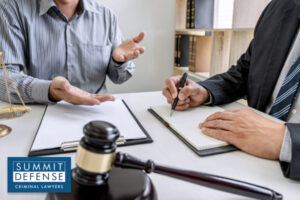


Your criminal defense attorney must follow strict rules about false testimony. While we fight for your rights, we also have limits we must respect in the legal system. When you talk with your lawyer, that conversation is usually private. But this protection doesn't cover plans for future crimes, including perjury (lying under oath).
The United States Supreme Court has clear guidelines about how attorneys must handle clients who want to present false evidence. Violating these rules risks serious consequences—criminal charges, lost licenses, and harm to your case.
When you work with a criminal defense lawyer, it helps to know the ethical rules that guide our actions. The criminal justice system balances fighting hard for you with keeping the process honest. Your defense attorney walks a line between protecting your rights and fulfilling their sworn duty to the court. This balance gets tricky when questions about telling the truth come up. Let's look at why honesty forms the base of a good attorney-client relationship and how we handle sensitive information you share with us.
Being completely honest with your criminal defense lawyer gives you the best shot at a strong defense. When you tell us everything—even facts you think might hurt your case—you allow us to build a defense strategy that prepares for all challenges. We can't properly defend you against facts we don't know exist.
When you hide information or plan to lie, you set up your lawyer for surprise attacks from the prosecution's witness. Prosecutors may know things your lawyer doesn't if you haven't shared everything. These surprises in court can destroy your defense strategy and leave your lawyer unprepared.
Your criminal defense attorney needs the complete picture to create reasonable doubt in your case. The legal system tests evidence through an adversarial system. We can often find good ways to present tough facts in a better light, but only if we know about these facts beforehand. Hiding information or planning to lie prevents us from giving you our best defense.
When you share sensitive information with us, we follow clear, professional steps. We listen without judgment and see how this information fits into your overall case. This helps us understand your situation while keeping attorney-client confidentiality.
Your defense lawyer uses this information to predict what the other side will do. By knowing weak spots, we can develop counter-arguments, prepare you for tough questions, and find where reasonable doubt exists. This works much better than being surprised by facts you kept hidden or planned to lie about.
If you tell us you plan to lie under oath, we must follow specific ethical guidelines. We'll explain the problems with this approach and help you find legal alternatives. While we can't help with false testimony, we can show you how to present your case truthfully while still protecting your interests. Our goal remains fighting for your rights within legal ethics.

Attorney-client privilege keeps your talks with your defense lawyer private. This covers conversations, emails, phone calls, and letters between you and your criminal defense attorney. The privilege exists so you can share sensitive information without worry that it will be shown to the prosecution or used against you in court.
For the privilege to apply, you must be seeking legal assistance from your lawyer. Casual chats with a lawyer who happens to be your friend aren't protected. The communication must relate to getting legal help, and you must want it to stay private.
The privilege belongs to you as the client, not to your lawyer. This means only you can allow the information to be shared. Without your informed consent, your criminal defense attorney must keep these communications confidential, even if pressured by a judge or prosecution witness.
Attorney-client privilege doesn't cover plans to commit future crimes, including perjury or presenting false evidence. If you tell your lawyer you plan to lie on the stand, this falls outside the protection of privilege because it involves a future crime rather than past actions.
The "crime-fraud exception" is a major limit on confidentiality in criminal cases. If you try to use your lawyer's services to commit a crime or fraud, like lying under oath, those communications lose their protected status. This exception exists because the legal system cannot allow attorney-client privilege to become a tool for criminal activity.
When you tell your criminal defense lawyer you plan to testify falsely, you place them in a difficult ethical position. The rules of professional conduct require lawyers to maintain confidential communication in most situations. However, these same rules forbid them from helping clients commit fraudulent acts against the court. Your lawyer cannot help present perjured testimony, no matter how much they want to help your case.
In personal injury cases and civil claims, these principles apply just as strongly as in criminal defense. If you plan to exaggerate injuries or lie about how an accident happened, your attorney cannot knowingly help present this false evidence. Courts take a harsh view of dishonesty, often dismissing cases entirely when lies are discovered.
When you tell your defense attorney that you plan to lie under oath, you create serious professional and legal problems. This admission changes how your case must be handled, limiting your lawyer's ability to represent you effectively. The effects go beyond your attorney-client relationship into potential criminal penalties and lasting damage to your case.
When you tell your criminal defense attorney you plan to lie on the stand, they must first try to talk you out of it. Your lawyer believes this conversation helps protect you from making a choice that could lead to more criminal charges. They'll explain the serious legal and ethical problems with perjury and how it could backfire.
If you still insist on testifying falsely after being warned, your defense lawyer faces tough choices. Based on their lawyer's reasonable belief that you intend to commit perjury, they cannot knowingly present false evidence. If they know a client plans to lie, professional conduct rules obligate them to use 'reasonable remedial measures. This might mean asking to withdraw from your case.
Your lawyer has competing duties—to you as their own client and to the court as an officer of the legal system. When these duties conflict because the client intends to commit perjury, their obligation to the court comes first. The United States Supreme Court has made clear that lawyers cannot take part in fraud on the court, even when trying to zealously represent their clients.
If withdrawal isn't possible, your lawyer may need to limit how they present your testimony. Rather than the usual question-and-answer format, they might let you tell your story without their guidance. This allows you to speak without your lawyer helping present what they know is false evidence, though this approach carries risks for your case.
Perjury is a serious crime with heavy penalties. Lying under oath can be charged as a felony, and the person can be sentenced to up to seven years in prison. This means you could face more jail time for lying about your case than for the original charge. The criminal justice system takes false testimony very seriously because it undermines fair trials.
Beyond criminal charges, perjury destroys your credibility with the judge and jury. If your lie is discovered during the trial—and opposing lawyers are skilled at finding inconsistencies—the jury will likely disbelieve everything else you say. Even strong parts of your case become suspect once you're caught in a lie. A criminal defendant who has committed perjury faces an uphill battle.
In personal injury cases, the stakes are equally high. Insurance companies investigate claims thoroughly and often have evidence that can contradict false testimony. Once caught in a lie, your entire claim may be dismissed. Some insurance policies have fraud clauses that void coverage completely if the claimant gives false testimony.
The long-term consequences extend beyond your current case. A perjury conviction creates a permanent criminal record that affects future job prospects and housing applications and can be used against you in any future legal proceedings. The short-term gain you might hope for by lying simply isn't worth these lasting consequences.

Defense lawyers follow the Rules of Professional Conduct that govern all attorneys who practice law. These rules require us to represent clients with dedication while maintaining our lawyers' duty as officers of the court. Your criminal defense attorney must balance these sometimes competing obligations when building your defense strategy.
California's Rules of Professional Conduct specifically address false evidence. Rule 3.3 states that lawyers shall not knowingly "make a false statement of fact or law to a tribunal." This rule places clear limits on what your defense lawyer can do, even when trying to get you the best possible outcome.
These ethical standards serve to protect both clients and the justice system. By preventing perjured evidence, they maintain the reliability of court proceedings and ensure that decisions are based on truth. While this may limit your defense options, these rules protect all parties by keeping the legal process fair.
Following these ethical guidelines serves your interests in the long run. A lawyer who presents false evidence risks disbarment and criminal charges themselves, leaving you without representation. Plus, courts and juries often see through false testimony, damaging your credibility far more than honestly addressing challenging facts.
The answer is clearly no—your criminal defense lawyer cannot allow you to lie under oath. When your lawyer has actual knowledge that you plan to offer false testimony, they must take steps to prevent it. This isn't a personal choice for your attorney; it's a professional requirement with serious consequences if violated.
Your defense attorney's primary duty shifts when you, as the client, insist on committing perjury. While normally focused on protecting your defendant's constitutional rights, they must prevent fraud in the court, even at the expense of your case. The American Bar Association and the United States Supreme Court have consistently ruled that lawyers cannot participate in presenting perjured testimony.
Instead of planning to lie, work with your lawyer to present your case truthfully but effectively. Experienced criminal defense attorneys have legal strategies to address problematic facts without resorting to falsehoods. These include challenging evidence, presenting alternative interpretations of events, or highlighting reasonable doubt without requiring any false testimony.
When you take an oath to tell the truth in court, you enter a world where dishonesty carries severe consequences. Many people underestimate both the chance of being caught in a lie and the harsh penalties that follow. The courtroom is designed to test the truth through cross-examination, evidence verification, and the watchful eyes of experienced legal professionals.
In California, perjury carries serious criminal penalties. First-degree perjury is a class D felony punishable by up to 7 years in prison. This charge applies when you make materially false statements under oath in an official proceeding, like a trial. The criminal justice system treats perjury harshly because it attacks the foundation of fair trials.
Prosecutors have effective methods for detecting perjury. They compare your testimony with other evidence, including:
In personal injury cases, insurance companies often gather extensive evidence to verify claims, making false testimony particularly risky.
The prosecution doesn't need to prove why you lied; it is only that you did so knowingly. "I forgot" or "I was confused" rarely work as defenses when evidence clearly contradicts your sworn testimony. The legal standard requires that you knowingly make a false statement, and juries often easily recognize dishonesty.
Judges treat perjury with particular severity because it undermines the entire legal system. Beyond formal penalties, judges have wide discretion in sentencing and rarely show leniency to defendants caught lying under oath. Your false testimony shows disrespect for the court that most judges take personally, making them less sympathetic to your case.
When you're caught in a lie under oath, judges and juries typically dismiss your entire testimony. The legal principle "falsus in uno, falsus in omnibus" (false in one thing, false in everything) often applies. Once your credibility is damaged, the court may disregard even the truthful parts of your testimony.
Opposing lawyers use powerful techniques when they catch you in a lie. They might present evidence that contradicts your statements or force you to admit the lie in front of the jury. These moments often become the turning point in trials, after which recovery is nearly impossible.
Personal injury cases are particularly vulnerable to credibility issues. Since these cases often hinge on the plaintiff's testimony about their injuries and how they occurred, lying about any aspect can cause the entire claim to collapse. Insurance companies and defense attorneys actively look for inconsistencies that suggest dishonesty.
The damage extends beyond your current case. Court records are permanent, and a finding that you committed perjury will follow you to future legal proceedings. In subsequent cases, opposing counsel can introduce your prior false testimony to challenge your credibility, making it extremely difficult to win any future legal action.

Your criminal defense attorney has many legitimate tools to build your defense. We can challenge whether the prosecution's evidence shows substantial bodily harm or if a threat existed to justify self-defense. We can question whether searches were constitutional or if evidence was properly handled. These challenges often succeed where false testimony would fail.
Proper case preparation involves thorough investigation and evidence gathering. Your defense lawyer will look for witnesses, documents, or other material evidence that supports your version of events. We resolve doubts about the case by finding facts that support your side. This legitimate fact-finding often reveals information that helps your case in ways you might not have anticipated, removing any perceived need to testify falsely.
We can effectively address case weaknesses without requiring false testimony. This might involve providing context for damaging evidence, offering alternative explanations based on your client's actions, or highlighting gaps in the prosecution's case. These approaches create reasonable doubt within the bounds of truthful advocacy.
Professional legal guidance helps you understand how juries perceive different types of evidence. Your criminal defense attorney can help you present truthful testimony in the most favorable light possible. This includes preparation for cross-examination and advice on how to handle difficult questions honestly but effectively.
Honesty with your lawyer enables more creative and effective defense strategies. When we know the full truth, we can anticipate the prosecution's moves and prepare countermeasures. This strategic advantage is lost when you plan to lie, as your lawyer's job becomes impossible when they cannot properly prepare for how that lie might unravel under scrutiny.

Our experience with complex cases gives us the perspective to handle difficult facts ethically. We follow the ABA model rules to ensure your case isn't derailed. During confidential consultations, our client reveals sensitive information in a protected environment. Contact us today at [phone number] to discuss how we can help while maintaining the highest professional ethics.
latest News
A federal jury in the Eastern District of California, in Sacramento, on Thursday, March 26, 2015, acquitted two defendants, Deborah Loudermilk and Buena Marshall, of mail fraud charges arising from allegations that they participated in a 2006 mortgage fraud scheme. In the prosecution of the case, the government presented 26...
Being falsely accused of domestic violence is terrifying and confusing. It can affect your reputation, job, and even your relationship with your children. These accusations can lead to arrest, court hearings, and the risk of a permanent criminal record. Many people feel overwhelmed and unsure of what to do next....
A conviction for domestic violence can lead to surprising and far-reaching life changes. Even after the court process ends, the long-term consequences stay with you. You could lose your job, face restrictions at home, and even risk losing custody of your children. In California, the penalties for domestic violence offenses...
Contact us now for a
free consultation
580 California Street, 12th Floor
San Francisco, CA 94104
1970 Broadway, Suite 1145
Oakland, CA 94612
2570 N 1st Street, 2nd Floor
San Jose, CA 95131
533 Airport Blvd, Suite 400
Burlingame, CA 94010
6200 Stoneridge Mall Road, Suite
300 Pleasanton, CA 94588
370 Convention Way Suite 316
Redwood City, CA 94063
500 Capitol
Mall Sacramento, CA 95814